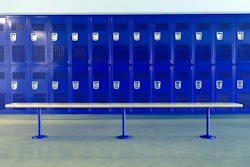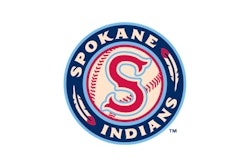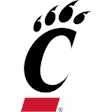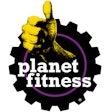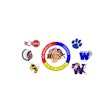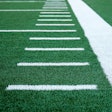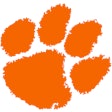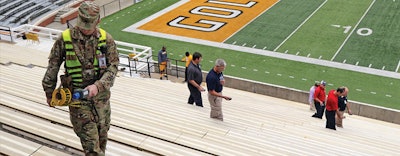
Back in 2017, the National Center for Spectator Sports Safety and Security at The University of Southern Mississippi brought in the National Guard's chemical, biological, nuclear, radiological and high-explosive testing response team to search for deposits of Cesium-137, a radioactive element, that had been planted throughout the university's M.M. Roberts Stadium.
When the National Guard team had successfully completed the test and identified where the Cesium-137 was located, NCS4 repeated the exercise, this time using Passport System's SmartShield product to conduct the test.
"When the National Guard was done, we used this little Passport system, which consisted of Samsung 6 phones with an application that allows you to see where the other phones are and ergo where the people are and then everybody had the little radiological detectors on their belts, which look like an old-fashioned pager," explains Christopher Kinnen, manager of the National Sports Security Lab at USM. "And then we just walked through and found the same stuff. It was a very worthwhile exercise and the company did very well in the test."
The exercise was part of NCS4's "Lab Tested" program, which puts safety and security solutions for sports venues through testing in an operational environment by industry and subject-matter experts (SMEs). Successful completion results in attaining the "Lab Tested" designation, inclusion in NCS4 information programs and special recognition at NCS4 events. Following an evaluation, solution providers are also given a detailed report on their product's performance, which they can use as a marketing testimonial or as a guide to product improvement.
The impetus for the lab came in 2009, when the NFL approached NCS4 director Lou Marciani and recommended the establishment of a lab for testing and reviewing technology that could be used to help make stadiums and arenas safer. "The NFL felt that having access to a list of technologies that had been previously vetted by NCS4 would allow them to sort through all the possible technologies that were available and help them narrow down what would potentially be most useful to them," says Joslyn Zale, technical writer and compliance coordinator for NCS4. "That's where the lab started. That was a while ago, and a lot of effort went into getting from there to where we are now."
Since then, NCS4 has coordinated the independent evaluation of a variety of products used in sports venue security. Half-baked products are not considered. They have to be market ready, and Kinnen emphasizes the integrity of the program. "We really try to understand what they want to get out of the test, what's really going to put their product through the ringer and demonstrate its capability most appropriately," he says. "We're not trying to rig this. We really want this to be a true and faithful demonstration of their capabilities. That's part of the reason we don't allow them to try to take excursions and test something that isn't operational, which would preclude it from being counted in the scoring. We want to faithfully represent what the product is in the environment."
The process itself involves a rigorous testing of the product in the environment in which it's intended to be used. As was the case with Passport's SmartShield, many products are tested in professional or college stadiums and arenas. How long the process takes depends on the product and what's necessary to truly vet its capabilities. "We get an understanding of what the capabilities of their product are, and then we try to create a matrix for subject-matter experts that we're going to recruit to come in and evaluate the product inside the ecosystem," Kinnen says. "We want to make it so the evaluators have a pretty simple task. They can see the equipment demonstrated under the use case conditions and determine whether it does what it's supposed to do. Then they can offer comments on ways to improve it, or things that they detected that are really powerful capabilities."
The cost to companies of having their products evaluated is minimal. As a nonprofit organization, NCS4 charges participating companies the cost of covering the subject-matter experts' time, which includes travel, a stipend and other related travel costs.
The "Lab Tested" certification is definitely a feather in the company's cap, but the program is more far-reaching than that, benefiting both the company and operators looking for the right solutions. "Part of this is not just educating the experts on the product and what it's capable of doing," Kinnen says, "but also affording the company the opportunity to talk with people who work in this industry, and they can discuss what the market looks like and business cases."
On the other side of the equation are the operators. "The NFL and Major League Baseball, all these professional sports organizations, the colleges, they get approached by companies all the time," Kinnen says, "and some of the technologies you wonder, 'Do they fit inside the sports and entertainment ecosystem? And if they do, where? And do they actually do what the company says they do?' "
Here's a sample of a few unique, "Lab Tested" state-of-the-art solutions that aim to improve venue safety and security for fans and operators alike:
![[Photo courtesy of NCS4]](https://img.athleticbusiness.com/files/base/abmedia/all/image/2019/09/ab.safety919a.png?auto=format%2Ccompress&fit=max&q=70&w=400) [Photo courtesy of NCS4]
[Photo courtesy of NCS4]
Live Earth – Live Earth
Live Earth aims to offer operators better visibility of their venues through a visualization software platform that allows for the integration of numerous live and static data feeds into a single operational dashboard. The open-source platform consolidates a facility's existing data streams, offering staff a common operational picture that adds context to pretty much everything happening at the venue. Staff can then interact with the data on a large touchscreen, accessing everything from security cameras to real-time parking and weather information.
The true magic of Live Earth is in knowing where everyone is within and around the venue at all times. For instance, as tickets are scanned, that information is fed into the system. The number of cell phones hitting any particular hub is also fed into the system. When this information is synthesized, the operator is able to glean insights on where congestion or other problems might occur and respond accordingly. Multiple layers of information can be synchronized with security cameras, which then generates a heat map, so an operator can see areas of crowd density.
Live Earth was evaluated by: A select group of sports safety and security subject-matter experts. The collective professional experience of the evaluators encompassed law enforcement for special events, and security and operations for professional sports leagues and universities in the United States.
![[Photo courtesy of Live Earth]](https://img.athleticbusiness.com/files/base/abmedia/all/image/2019/09/ab.safety919b.png?auto=format%2Ccompress&fit=max&q=70&w=400) [Photo courtesy of Live Earth]
[Photo courtesy of Live Earth]
Hoverfly – LiveSky Secure Tether-Powered UAS
Hoverfly Technologies designs and manufactures aerial drones that are tethered to a power supply, which means they can stay aloft for hours, days and weeks, allowing operators a bird's-eye view of their venues for an entire event. The company pitches its LiveSky Secure Tether-Powered Drone as a way to enhance overall public safety and improve the security operating picture. The drones come with a range of sensors and payloads that can provide actionable intelligence and high-bandwidth communications. Hoverfly promises that no special piloting skills are required for operation of its products, as the drones are controlled with an easy-to-use, five-button control system.
LiveSky Secure Tether-Powered UAS was evaluated by: A select group of subject-matter experts from the sports security domain. This group consisted of professionals from public safety, sports and athletic facility operations, and information technology. The collective group of SMEs had a base of experience that encompassed collegiate and professional sports, and major event safety and security operations.
Cobalt Robotics – Cobalt Robots
Cobalt Robotics offers security services that are supported by robots. The company's autonomous indoor robots are remotely managed by the Cobalt Security Operations Center team — combining the sensors, surveillance and recall of an onsite robot with an offsite team of human security robotics specialists. The company says its robots are equipped to sense a wide range of incident types, including human activity, open doors, leaks, spills and unusual sounds. Armed with this array of information, Cobalt specialists can assess situations, reduce false alarms and flag verified events immediately.
The Cobalt Robot was evaluated by: A select group of subject-matter experts from the sports safety and security domain. The evaluators were senior directors of professional and collegiate sports facilities in the United States. The collective group's base of experience encompassed collegiate and professional sports, facility and venue management, and major event safety and security operations.
![[Photo courtesy of Live Earth]](https://img.athleticbusiness.com/files/base/abmedia/all/image/2019/09/ab.safety919c.png?auto=format%2Ccompress&fit=max&q=70&w=400) [Photo courtesy of Live Earth]
[Photo courtesy of Live Earth]
Passport Systems – SmartShield™
With the threat of terrorism always looming, Passport's SmartShield system is a powerful solution to have on hand. SmartShield is a handheld device that's designed to detect radiological threats. The system provides an interface for a gamma-radiation detector and smartphone technology, supporting both local and wide-area networking functionality. The system includes a handheld gamma-radiation detector, a smartphone with embedded software, and a laptop that runs SmartShield and links individual detectors to a single platform.
SmartShield™ was evaluated by: A select group of subject-matter experts from the sports security and radiological response domains. The group consisted of professionals from public safety, nuclear operations, emergency management and radiological response. The collective group of SMEs had a base of experience that encompassed sporting and major event safety and security operations.
This article originally appeared in the September 2019 issue of Athletic Business with the title "NCS4's 'Lab Tested' program vets security products for venue operators." Athletic Business is a free magazine for professionals in the athletic, fitness and recreation industry. Click here to subscribe.



















